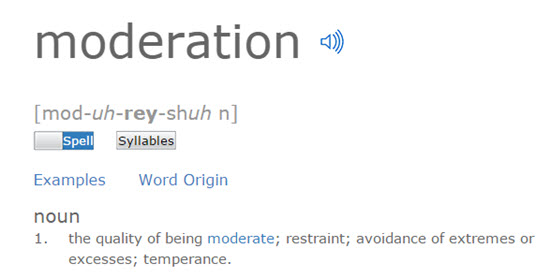
When it comes to food, no doubt you”™ve heard, read, or even said something along these lines: Everything”™s fine in moderation.
Many famous people have said that they”™ve never been successful at achieving moderation.
Professionally, I never recommend moderation in sugar intake.
Instead, I favor this quotation by Saint Augustine: “To many, complete abstinence is easier than perfect moderation.”
Clinical experience has taught me that some people simply can”™t achieve moderation around certain foods.
Sugar addiction is real. Encouraging a sugar addict to eat sugar “moderately” makes no sense. It makes as much sense to tell a recovering alcoholic to drink in moderation — or a smoker who”™s just quit to smoke in moderation.
In fact, when you”™re talking about addiction of any type, moderation makes no sense at all.
Many Of Us Should Abstain From Moderation
In cases of addiction, moderation may be an impossible goal. For some of my clients, a small amount of any addictive substance — alcohol, sugar, whatever — simply leads to more. In addiction literature, the phenomenon is known as “priming.”
When I”™ve brought up priming and sugar, self-styled censors have chastened me online. Apparently, researchers have not yet tested such a thing on sugar.
My dissertation study, however, showed priming among women with binge eating disorder who were also sugar-sensitive. Sugar was a primary food trigger for their binges.
Yet lab research is often behind the curve — which seems exactly the opposite of the way things should be. Scientific research happens when a need, a problem, is perceived. It”™s my strong hope that researchers will soon realize that we need to acknowledge and start testing priming and sugar.
The research delay isn”™t surprising. I”™ve been speaking and writing about sugar addiction for almost 25 years — and only now is it becoming mainstream thinking.
Better late than never, of course. A lack of abundant scientific study in the past didn”™t make the notion false, though — just ahead of its time. Research existed back then but was limited. Much was done on animals, but not all. Chocolate studies, for example, were always conducted with human participants. But I digress.
The Moderation Myth Makes Clients Feel Crummy
The main reason I dislike the myth of moderation is it makes my sugar-sensitive clients feel as if something”™s wrong with them. That bothers me.
When sugar addicts can”™t eat certain foods in moderation, no one”™s to blame. Certainly not the sugar addicts — it”™s a brain chemistry thing.
Brain chem is largely genetic. You got what you got. I”™m old enough to recall the public service announcements that used frying eggs to show us “This Is Your Brain On Drugs.”
‘Your Brain On Sugar”™ isn”™t your fault.
People now agree that sugar is addictive, yet the implications remain a mystery to some. Who cares who says what about moderation? Do what works for you.
If it”™s easier for you to abstain completely than to try moderation … then fail … and then feel crummy about yourself, I strongly encourage you to abstain.
Saint Augustine would support you, too.
- New Year’s Resolutions: A Sugar Addict’s Survival Guide - April 15, 2024
- Motivation vs. Enthusiasm - October 12, 2023
- Why Exercise Shouldn’t Be Just One Thing - November 9, 2022
